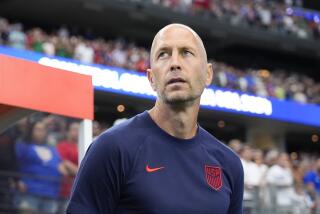South Africa Needs to Be Wary
BERLIN — Already, it has started.
On Friday, two days before the final of the 2006 World Cup, the trickle of hyperbole that eventually will become a flood of self-serving nonsense was being spouted by those having to do with the South Africa 2010 World Cup.
In Berlin, syrupy promises that will be quite impossible to keep were being made by the usual politicians and those who court their favor.
Ignored in all the self-congratulatory mumbo jumbo was the not-too-far-fetched possibility that the next World Cup could be yanked out of Africa and moved somewhere else. The U.S. is one standby candidate.
Once South Africans realize just how much of their money will have to be spent on stadiums, communications, security and all the other necessities of a major international sporting event, they might be quite pleased to see the circus bypass their already troubled portion of the globe.
South Africa has AIDS problems. South Africa has crime problems. South Africa has poverty problems. Schools and hospitals would seem a far greater priority than putting on a sideshow for one month in their winter of 2010 so that international corporations can fete their clientele in hospitality tents while Africa’s hungry watch and weep.
But that is not what Thabo Mbeki, South Africa’s president, or Kofi Annan, the secretary-general of the United Nations, or Joseph “Sepp” Blatter, the president of FIFA, wanted to hear Friday.
For them, it was all sweetness and light. A great day for Africa. A great day for soccer.
“One of the outstanding features of the 2010 World Cup is that the Cup will stay in Africa,” Mbeki told a gathering in Berlin that was intended to launch the next world championship.
The only way that will happen is if FIFA decides to create a new trophy.
Certainly, South Africa will not win it. The Bafana Bafana, as the team is known, failed to qualify for 2006 and is in such disarray that four years will not be enough to fix matters. Of course, FIFA is quite good at fixing things.
Africa’s five participants in this World Cup failed just as miserably as their counterparts in Asia and CONCACAF, soccer’s North and Central American and Caribbean region.
The Ivory Coast played attractive soccer but did not reach the second round. Ghana made it to the second round and then was routed. The less said about Angola, Togo and Tunisia the better.
Annan was just as bad as Mbeki, bowing and scraping to FIFA as if his own organization were some sort of minor league assemblage.
“The World Cup makes us in the United Nations green with envy,” Annan simpered, noting again that FIFA has more members than the U.N., as if that meant anything.
Annan also made the quite extraordinary statement that if the public paid as much attention to politicians as soccer fans pay to their sport, the world would be a better place. “With that kind of public scrutiny, good government would not be an option,” he said.
Presumably, Annan has not been kept up to date on the soccer scandals that have flared in one country after another, with match-fixing, referee-bribing and racism rife in the sport and FIFA’s leaders interested only in catering to the sponsors and TV networks that keep replenishing the organization’s already bulging coffers in Zurich, Switzerland.
And presumably the U.N. head has not been kept informed about African soccer leaders Ismail Bhamjee of Botswana, who was tossed out of Germany for scalping tickets, or Celestin Musabyimana of Rwanda, who allegedly forged documents to obtain $37,000 worth of tickets.
FIFA’s Blatter, meanwhile, was Blatter. Once a public relations man, always a public relations man. Open mouth, insert inanity.
“It will not be the same World Cup we have here in Germany. But it will be an African, a South African World Cup. There will be a lot of drums around and other music,” he gushed.
Reuters last month dispatched a correspondent to check out South African soccer at ground level. One sentence alone stood out:
“Peckish after a game, spectators in Berlin might retire to myriad street cafes and restaurants. Fans in Soweto choose between scores of makeshift stalls at the foot of a giant slag heap that sell barbecued chicken feet and dumplings.”
Of course, FIFA’s corporate partners will not be gnawing on chicken feet at the foot of a slag heap. That is for the common fan.
Just a few days ago, Blatter was mumbling other strange mumblings:
“South Africa is a flourishing country with the largest gold reserves and diamonds and other minerals. When you look at the telecommunications and roads, etc. I do not have any problem with that.”
Beware, South Africa, when FIFA starts talking about your gold and diamonds, and ask yourself, do we really need this?
After so many decades in the hands of erstwhile leaders such as Blatter and his predecessor, Joao Havelange, to whom the real fans mean less than nothing, the World Cup has degenerated into a second-class event.
Whatever the image presented on television, the reality is that a once-proud tournament has become a cross between the X-Games and an infomercial, all at full volume and all in an atmosphere of sweat, testosterone, beer and cigarette smoke.
Even the soccer has been of a watered-down variety. Franz Beckenbauer, head of the Germany ’06 Organizing Committee, confirmed as much Friday.
“There were not many bad games, but there were no real thrillers,” he told SID, a German sports agency. “I have been on a panel to pick out the best 10 players at the tournament. We could have picked a completely different 10. There were no standout players.”
Is this what South Africa wants? A bloated tournament that has outlived its usefulness?
Or can South Africa show some courage and demand a new way?
Perhaps it should insist that for every stadium that goes up, a school or hospital must be built. Or for every dollar that goes into putting on the circus, a dollar must go toward feeding the poor or fighting AIDS.
South Africa should demand a smaller World Cup, a more socially responsible World Cup, a World Cup that leaves a legacy of hope rather than a slag heap of hype.
The initiative will not come from FIFA. It has to come from South Africa. And if FIFA does not like it, then Blatter and his ilk should be told to peddle their World Cup elsewhere.
Africa will not be any the poorer without it.







